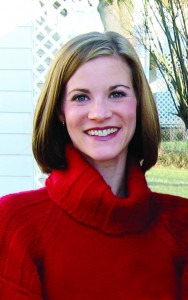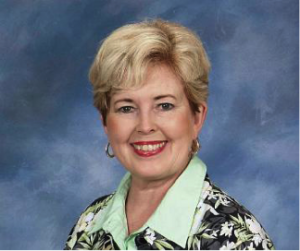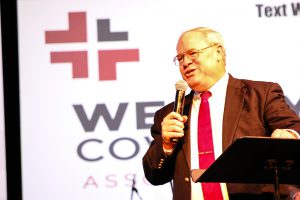
by Steve | Sep 15, 2017 | Magazine, Magazine Articles, September/October 2017

Reed Hoppe
By Reed Hoppe-
How do you find hope in a place like South Sudan?
Dr. Sharon Fogleman, a missionary to South Sudan with TMS Global, asked this question when she addressed our staff one morning. As Christians, we often talk about having our hope in Christ. Yet when your country is enveloped in civil war, your children are starving, and you have been forced to travel a long and dangerous journey to a refugee camp, what does your faith look like? How do you find hope when you have lost everything?
Doctors Lynn and Sharon Fogleman moved to South Sudan in 2012, soon after the country gained independence. Both family physicians, Lynn and Sharon taught a Community Health and Disease Prevention program within The United Methodist Church of South Sudan.
Although violence was a common part of life in this new country, the team resided in Yei, which remained relatively safe. That changed in 2016 when tension between government and rebel forces increased dramatically. “Government soldiers were raping people, looting businesses, burning homes, and killing anyone they found who sided with the rebels,” said Lynn. “The rebels were doing the same thing, so travel beyond our town became very unsafe.”
The Foglemans’ good friend and fellow missionary, Sister Veronica of St. Bahkita Hospital, was killed in May of 2016. A Catholic nun and a physician, she was traveling home by ambulance after taking a patient to the hospital. Soldiers ambushed the ambulance and shot her.
That July, the TMS Global team made the difficult decision to leave Yei. They each packed a small bag and made the dangerous drive to the border, which was closed an hour after they crossed into Uganda. The war has caused more than 1.6 million South Sudanese to leave the country as refugees, and an additional 1.9 million people to be internally displaced. Most have fled to Uganda, where more than 850,000 people are residing in refugee camps, a number which is expected to rise to more than one million by the end of the year.
Many South Sudanese are subsistence farmers who have been unable to tend their crops due to the fighting. The addition of a drought plaguing the area has led to an estimated 100,000 people living in famine, and 40 percent of the population is facing extreme hunger. Aid organizations are desperately trying to get food to people who need it, but the fighting has blocked some areas from receiving aid.
After fleeing South Sudan, the TMS Global team settled in Uganda and is serving in refugee camps on the border. Lynn, Sharon, and Carolyn, a retired nurse, have been joined in Uganda by Nancy, a former hospital CEO and respiratory therapist.
In the camp, TMS Global workers are providing medical care and healthcare education, and are discipling Christians in their faith. Carolyn was recently trained in biblically based trauma counseling in order to minister to residents. She is also training South Sudanese pastors at the camp so that more people can receive counseling.
“Soon after they arrived at the refugee camp, Christians had pulled together and were helping one another,” said Sharon. “Their resilience was amazing. They had set up a compound of tents for the 36 orphans from the children’s homes in Yei and were caring for them. The community radiated hope.
“While we were talking to the children, one of the leaders asked the kids to say what they wanted to be when they grew up. They each stood up with a smile on their face and listed teacher, doctor, driver, mechanic, and other professions. The leaders were not going to let these kids stop dreaming of their future. There we saw hope.
“Although South Sudan is in a very dark place right now, we still see hope. The Christians in South Sudan know that Jesus is their only hope, and that is what they cling to. Join us in praying for peace in South Sudan.”
Reed Hoppe is the associate director of communications for TMS Global – www.TMS-Global.org.

by Steve | Sep 15, 2017 | Magazine, Magazine Articles, September/October 2017
 By B.J. Funk-
By B.J. Funk-
My daddy never liked that my friends minimized my double name into initials. Until he went to heaven at the age of 87, he called me Betty Jo unless, since I was the baby, he affectionately called me Baby Jo. He often put me on his knee and told me the story of the Betty Jo Princess. That’s me. I was his princess. His story of me was filled with sweet thoughts, beautiful pictures, and happy endings and was formed by how my daddy viewed me. I wanted to stay in that story forever.
But, then life happened. Young adulthood brought disappointments and difficulties, and the Betty Jo Princess felt the need to hide from life. Climbing back up and shaking myself off, I was ready for the next story. God’s story. That’s where my heart is now, and that’s the story I want to stay in forever. He, too, sees me as His princess. The real story of me is formed by the way my Father views me.
Like me, your story has not turned out exactly as you had planned either. During your up days and down days, every question and every answer did not feel good. Perhaps you felt the need to hide. After some time, you climbed back up, shook yourself off and began the real story of your life. God’s story. That’s the story that balances highs with lows, smiles with tears, and brokenness with strength. No glossing over. No kisses making it all well. No rainbow hunting or sugary hugs. Just a reality that is hard and yet secure, because we all know by now that it’s much better to let life shape you than to hide behind everything we presume is real, only to find out it never was.
In practically every story you read in the Bible, you can find yourself. Let’s take, for instance, the book of Genesis. Walk into the Garden of Eden as God comes down to visit with his children. Are you hiding beside Adam and Eve, hoping God won’t find you because you have disobeyed? Move with Moses as he begins the long desert journey with the Hebrews. When all of the weary travelers begin to grumble because they have not found water, is that you standing close to Moses and grumbling the loudest because things aren’t going your way? When Moses came down with the Ten Commandments, had you given all of your gold jewelry to help make the golden calf you could worship with the others? When did you decide your God is not enough? Seriously?
Watch Joseph’s brothers throw their little brother into a cistern, leave him for dead and then lie to Jacob, deceiving their aging father for years. How long have you held on to a lie in your family? Have you deceived someone who trusted you?
The remarkable and unbelievable part of your walk through Genesis and all of the Bible is that God walks it with you, making a weaving out of the ups and downs of your life, placing love right beside every wrong choice you make. The amazing truth that stands out in your story is that God watched you hide, grumble, deceive, lie, and worship an idol, and he didn’t throw you off the planet because of it. Instead, he tenderly embraced you, loving you through slip-up after slip-up, never condemning you and always reminding you that you are precious in His sight.
You might not always hear His love sounds. He places them inside of us, near our hearts, where they vibrate healing life. You might not always feel his love touches, but they are there. Silently, sweetly, and carefully, he stamps your hand with “Approved” and then waits for you to find out that you really are.
As the story of your life takes the heavy waves that crash against your soul, you will be reminded quite often that you are loved with an unfailing love by an unfailing God. On the days when the tears flow and you don’t understand, God watches closely as you give your tears to him. He doesn’t plan on ever leaving you. If there’s any leaving to do, you’ll have to be the one to do it.
But, why would you? What’s safer on the greener grass of the other side? Only God. Realize today that whatever is happening in your life is the continuation of God’s story for your life. Your story is still unfolding. Seeing your life this way puts a stamp of “Whatever – and Hallelujah” all over your heart.
I choose the story of my life to be God’s story. What about you?

by Steve | Jul 10, 2017 | July-August 2017, Magazine, Magazine Articles

Rev. Rob Renfroe
By Rob Renfroe-
For 50 years, Good News has made a commitment to open dialogue about the divisive issues within The United Methodist Church. These topics include Sunday school curriculum, global ministries, theological pluralism, seminary education, ministry with women, and issues surrounding marriage and sexuality. Our staff and members of our extended supportive network have been faithful partners in most of the major face to face discussions about these issues with boards and agencies, as well the work of the General Conferences and annual conferences.
While we are committed to an evangelical and traditional viewpoint, we have respectfully listened carefully to other viewpoints at dialogue tables. We may not always agree, but we put a high value on engaging the issues and listening to those who do not share our perspective. Nevertheless, it does get wearisome to hear some of the same old arguments as if they are new revelations able to reconcile our differences, change the narrative, or convince those of us on one side of the argument that we’re wrong. Let me give you a few examples.
“It’s about people.” Progressives use this line, many sincerely, to remind traditionalists that our theological perspectives regarding LGBTQ issues impact the lives of real, often vulnerable people. It is something we need to remember. When we talk about homosexuality we must do so with the knowledge that people who may have been mistreated or demeaned because of their sexual attractions are listening. We are committed not to use language that appears to deny their humanity, their worth, or how much God loves them.
Unfortunately, too often the intent of the phrase goes deeper than telling us to be careful with our language. It is used to undercut our theological perspective. In fact, it is sometimes used to tell us that it is wrong to express any belief that makes others uncomfortable or causes them to question their sexual practices or desires. The charge alleges that if we hurt someone’s feelings or cause them to consider whether their sexual practice – heterosexual or homosexual – is outside the will of God, we have done wrong by doing harm to “real people.”
Even if I agree that “it’s about people,” I can still disagree that what is most important about people is how they feel about themselves or how they identify sexually. Our discussion around sexuality does impact the lives of real people – and what’s most important about people is not if they feel good about themselves but if they stand right before God.
One option is presented by those who, in the name of Christ, tell people that they must be true to themselves even if it means engaging in behavior the Scriptures teach to be displeasing to God. The other option says we must take up our cross, deny our sinful desires, and follow Jesus. Which option is more harmful?
As Christians, our first question is not what brings us happiness but what pleases God. Granted, our discussion about sexuality is about people, but ultimately it’s about real people who will stand before a holy God and will either live with or without him for eternity. We will all need grace when that moment comes. But the last thing I want to tell people is that they should continue in sin and presume on the grace of God.
We traditionalists must be very careful with our language and never speak in a way that demeans other human beings, even when we speak about sin and repentance. At the same time, I would appeal to my progressive/revisionist friends not to promote what is contrary to the will of God.
“Why can’t the denomination handle our differences the way we do in my local church?” Pastors who say this mean that their congregation has different opinions regarding marriage and sexual practice and they remain together in love and ministry. Why can’t the UM Church do the same? My response to such pastors is always the same: What would happen in your local church if you or another pastor on your staff performed same-sex weddings in your sanctuary on Saturdays? What would happen in your church if your pastor was married to someone of the same gender? It is safe to assume that some of your people would leave. Others would stop giving. Your congregation could very well become angry, divided, and much less effective in ministry.
Well, that is where the denomination is. We do not just have different opinions, we have different practices. Pastors are marrying gay couples with the approval of their bishops. And annual conferences are knowingly ordaining partnered gay persons even though the Book of Discipline and the Judicial Council say they should not. Progressives believe that traditionalists are denying justice to LGBTQ persons and they cannot live with that. We believe some are promoting sin, denying biblical teaching, and breaking our covenant. And that is why we cannot ignore our differences and act like all is well as your local church does.
Another rhetorical device centrists and progressives use is to ask the question, “Can’t we imagine another way of handling this situation?” Unfortunately, the question is most often asked by those who fancy themselves intellectual, creative, and above the fray. My response? “What have you imagined that solves our problems in a different way?”
For nearly five decades, bright and sincere people on all sides of the issue have tried to think of different ways to resolve our differences regarding marriage and sexuality. Up to this point no one has been able to imagine a solution that has brought us together. Is it possible to imagine another way of solving our division? I guess so. But you do not solve the problem by just asking the question. You solve the problem by coming up with a solution.
What if someone had told Dr. Martin Luther King Jr., “Can’t we imagine a different way of resolving our racial division other than persons of color possessing equal rights?” He surely would have responded, “No, justice is the only solution.” That is exactly how progressives within the UM Church see themselves. They are fighting for justice and equal rights within the church for gay persons wanting to be married and ordained.
Out of respect, the question should be asked of progressives if they can imagine a solution they can live with that does not require gay ordination and gay marriage. My guess is the answer you will receive is a clear and emphatic “no.”
Finally, “We’re better together.” This statement simply does not appreciate the deeply held, sincere beliefs of traditional, orthodox United Methodists. We are seeing faithful members leave the church every day, some after 70 years of being Methodist, because of our division and the rebellion of jurisdictions, annual conferences, bishops, and pastors. But we are pained to be in a church where segments dismiss the Bible as out of touch, promote what the Scriptures teach to be contrary to God’s will, and preach a theology more in sync with Unitarianism than United Methodism. Not all progressives do so, but enough do that we feel our doctrinal core is being undermined. And lay people in the pews are beyond exasperated when they see church funds used by our boards and agencies for a progressive political agenda rather than the Gospel of Jesus Christ.
I have heard clergy colleagues follow up by saying, “Our theological differences make our fellowship richer and deeper.” If that were so self-evident, why have we not joined up with the Calvinists, the Baptists, and those who do not believe in women’s ordination, or infant baptism. “But they’re not like us,” they would respond. The stark differences, however, within our own denomination over scriptural authority, Christology, and sexuality are dramatically highlighting the fact that we are two different churches with the same name.
My wife and I are better together. We are very different. She is artistic and a global thinker. I am more literal and linear. Sometimes those differences create tensions, but we work through them and we come to see the world in a more complete way than we would if we saw it through our own eyes only. But both of us are committed to keeping our marriage covenant. We would not be better together if one of us was cheating on the other and then shaming the other for not agreeing to change our marriage covenant to permit cheating.
What more can be said that has not been said over the past fifty years? We cannot have the same conversation that has failed to move us forward or resolve our differences. “You’re bad and I’m good.” “I’m right and you’re wrong.” “Listen to the stories of LGBTQ people and you’ll change.” “Read the Bible and you’ll admit you’re wrong.” We’ve done that ad nauseum. Isn’t it time for a different conversation, one that begins, “How can we stop fighting and set each other free to pursue what we believe God is calling us to do?”
Rob Renfroe is the president and publisher of Good News.

by Steve | Jul 10, 2017 | July-August 2017, Magazine, Magazine Articles

Photo courtesy of The Orchard.
By Walter Fenton-
The largest local church in the Mississippi Annual Conference in terms of worship attendance and one of the 25 fastest growing churches in the U.S. has now officially exited The United Methodist Church. According to lead pastor Bryan Collier, The Orchard Church (Tupelo) reached a settlement with conference leaders that made its departure official as of May 19, 2017.
The congregation agreed to pay 100 percent of its 2017 apportionments and to release the annual conference from all financial and legal liabilities. In turn, the conference has released the congregation from the trust clause. Therefore, The Orchard now has complete and unfettered ownership of its property and assets. (Local UM churches hold their property and assets in trust for the annual conference in which they reside, and would normally have to surrender the property and assets if they decided to leave the denomination.)
“There was just no question among [The Orchard’s] leaders that this was right move for us,” said Collier. “Our departure was not about the homosexuality issue per se, but about the general church’s inability to deal with it. Unfortunately, its failure became an enormous distraction to the kingdom work our congregation is called to do.”
“The Orchard fully embraces, as it does with all people, its need to minister to those who identify as gay, lesbian, bisexual, or transgendered, and with their families and friends as well,” said Collier. “But the denomination was not helping us do that. The Judicial Council’s recent, convoluted decision is emblematic of [the UM Church’s] inability to put the disagreement to rest. We didn’t want to let this one issue distract us anymore. We know the arguments on both sides, we’re clear in our hearts and minds where we stand, and we’re prepared to move forward accordingly.”
The multi-campus church has facilities in Tupelo, Baldwyn, and Oxford, and averages over 2,600 in worship attendance. Collier is the congregation’s founding pastor, and he and the church are celebrating 20 years of ministry together this year.
At the same time, Getwell Road UM Church in Southaven, Mississippi, also gave notice of its plan for an exit. Collier and the Rev. Bill Beavers, Getwell’s senior pastor, characterized their negotiations with Bishop James E. Swanson Sr., the episcopal leader in the Mississippi Area, and other conference officials as peaceful and civil.
Collier noted that there was no good model for a congregation that wants to leave honorably and without rancor, so both parties had to be creative. “Everyone in the process has tried hard to be God honoring,” said Collier. “We’re most appreciative of the tone of the conversation between ourselves and the conference’s leadership. It was peaceful because both sides were committed to making it so.” Getwell exited the denomination on June 4.
The Rev. Victoria White, Director of Connectional Ministries and Communications for the Mississippi Annual Conference, said, “We encourage everyone to keep the congregations at The Orchard and Getwell Road, and the entire Mississippi Annual Conference in their thoughts and prayers.”
Walter Fenton is a United Methodist clergy person and an analyst for Good News.

by Steve | Jul 10, 2017 | July-August 2017, Magazine, Magazine Articles

The Rev. Keith Boyette addresses a Wesleyan Covenant Association gathering in Memphis, Tennessee. Photo by Steve Beard.
The Wesleyan Covenant Association (WCA) has named the Rev. Keith Boyette as their first president. Boyette is a member of the Virginia Annual Conference and founded the Wilderness Community United Methodist Church 19 years ago. For eight years, Boyette served on the Judicial Council, known as the “Supreme Court” of The United Methodist Church, and was elected by his peers to serve as secretary of the Council. Prior to responding to God’s call to ordained ministry in the UM Church, Boyette was a practicing attorney in Virginia and Kentucky.
“We are very pleased to have Keith as our first president,” said Dr. Jeff Greenway, the Chair of the Wesleyan Covenant Association Council and pastor of Reynoldsburg (Ohio) United Methodist Church. “He has been an integral member of the team that cast the vision for the WCA from the very beginning and is committed to the renewal of the church. He has vast experience in our denomination, and has demonstrated an ability to relate to a wide variety of people. He embodies our commitment to vibrant, evangelical, orthodox, Wesleyan Christianity, and to renewing the theology and practice of our denomination.”
Boyette most recently served as counsel to Mrs. Dixie Brewster before the Judicial Council in her petition to nullify the election of Bishop Karen Oliveto (page 34).
“I am humbled and excited by the opportunity to begin my service as President of the Wesleyan Covenant Association,” said Boyette. “I have contended for the advancement of evangelical, orthodox, Wesleyan Christianity throughout my adult life. This is a crucial season for those committed to a vibrant expression of the Christian faith that is true to the best of our heritage as we seek the most beneficial outcome for maintaining our beliefs with the approaching Special General Conference in February 2019. I look forward to working with others to ensure that we have deeply committed leadership possessing a fervent passion for the cause of Christ and to connecting churches, clergy, and laity in this endeavor.”
“Building a new organization from the ground up is what Keith does,” said the Rev. Carolyn Moore, the vice-chair of the WCA Council and pastor of Mosaic UM Church in Augusta, Georgia. “He comes to the WCA after 19 years of successfully planting and developing a healthy, creative expression of ‘church’ in Virginia. Having him in the lead as we craft a net wide enough to hold everyone ready to do a new thing is a real grace. I’m grateful to Keith for his willingness to step up and take us into the next Methodism.”
The Wesleyan Covenant Association was formed and their governing Council was elected at a gathering of 1,800 persons last October in Chicago. In its first seven months of existence it has grown to have membership from every Annual and Central Conference in United Methodism. Naming Boyette as president is the next step in the development of this growing organization that is committed to the theological and practical renewal of the UM Church.
Wesleyan Covenant Association press release. Editor’s note: The Rev. Keith Boyette is a former board member of Good News.
![My Joshua Tree]()
by Steve | Jul 10, 2017 | July-August 2017, Magazine, Magazine Articles

Photo by Steve Beard
By Steve Beard-
Thirty years ago, I drove 500 miles with college buddies to see U2’s “Joshua Tree” tour stop in Houston. “I can’t change the world / But I can change the world in me,” Bono had sung on a previous album. Young and idealistic, I believed it then. Strangely, I still believe it today. I’ve never forgotten that night – nor the long drive back to get to class the next day. U2 was recently back in Houston to mark the anniversary of the album that arguably handed them the keys to the kingdom of global rock stardom – #1 album in 23 countries. I’ve written extensively about these Irishmen over the last 20 years, but this full-circle “Joshua Tree” tour still triggered moments of emotional daggers-through-the-heart, tribal fist pumps, and Pentecostal hanky waving – transcendence.
The album concept was titled after a prickly and ungainly desert tree named Joshua by settlers because it resembled the Old Testament prophet’s out-stretched arms toward the heavens and deep roots – strangely symbolic for an Irish band from a country divided with sectarian barbwire and religio-political quagmires. Raised by a Protestant mother and a Catholic father, Bono lived the brutal divide. With the loss of his mother at age 14, he grew up under the weight and anguish of tragedy. Then there was the whirlwind of a charismatic revival among some of the bandmates and the stirring of a struggle between rock ‘n’ roll’s narcissism and an unseen kingdom where the first shall be last and the backstage passes are given to those who honor humility as a prime virtue.
Through all this, Bono remains rock ‘n’ roll’s most effective spiritual provocateur. He sees every stage as a pulpit and every coliseum as a cathedral. He talks breezily about the theological superiority of grace over karma to jaundiced rock journalists, launched the humanitarian One Campaign (one.org), and recently wrote the forward to the Bible paraphrase The Message. “My religion could not be fiction but it had to transcend facts,” Bono wrote in a forward to the Psalms in 1999. “It could be mystical, but not mythical and definitely not ritual.”
U2 has sold more than 170 million albums, collecting 22 Grammys along the way. This world tour features a stunning visual spectacle with a 200 x 45 foot high-def LED screen choreographing imagery with the music. For me, three vitally essential images stood out.

Photo by Steve Beard
First, a Salvation Army brass band accompanied U2 during the haunting “Red Hill Mining Town.” Never before played live, the song is about the devastation and helplessness of an unemployed miner. “Love, slowly stripped away/ Love, has seen its better day.” The Salvation Army is the most reliable global Christian symbol for faith in action – soup, soap, salvation, and loud music. Under the 150 year old banner of “Blood and Fire,” this ministry – operating in nearly 130 countries – has extended the hand of grace to the down and outers, prostitutes, alcoholics, morphine addicts, unwed mothers, and victims of human trafficking. The original plan was for a brass band to play at every stop on the tour, but the film of them playing in the Santa Clarita Valley of California provides a keen juxtaposition about U2 identifying with the historic message of Salvation Army founders William and Catherine Booth that help is only a drumbeat away (salvationarmyusa.org).
“This was a privilege to be a part of and so much fun to film,” Jacqui Larsson, a member of the ethnically diverse Salvation Army band from Southern California, told me. “It was great to represent The Salvation Army to such a wide audience. We have already heard a few stories of how this video has had a huge impact on people’s lives in a way we had never expected.”
In a long list of poignant moments, the second occurred when we were introduced to Omaima Thaer Hoshan, a 15-year-old Syrian girl in a refugee camp in Jordan. In the midst of the chaos of her circumstances, she voiced her aspirations and hopes for a better tomorrow. A gargantuan banner with her face is passed hand-to-hand throughout the stadium. It’s a not-so-subtle reminder that there is a hellhole on the other side of the globe. At bare minimum, pray for her safety and be grateful you are not where she is.
 Lastly, during a visual montage of notable female politicians and musicians (Sojourner Truth, Patti Smith, Angela Merkel, etc.), one stood out as a sister-in-arms with U2’s sonic art. Sister Rosetta Tharpe (1915-1973), a personal heroine, was the undisputed queen of rock and gospel music, shredding an electric guitar and boldly taking her sanctified skills and songs outside the four walls of the church – taking church to the people. Keep the faith, she would say to U2, and rock on. Bono has called “I Still Haven’t Found What I’m Looking For” an anthem of both doubt and faith. Whichever side of the coin you’re on, it continues to reverberate in the souls of saints and sinners alike. In the midst of uncertainty, it is anchored in redemption: “You broke the bonds / You loosed the chains / You carried the cross / And my shame / And my shame / You know I believe it.”
Lastly, during a visual montage of notable female politicians and musicians (Sojourner Truth, Patti Smith, Angela Merkel, etc.), one stood out as a sister-in-arms with U2’s sonic art. Sister Rosetta Tharpe (1915-1973), a personal heroine, was the undisputed queen of rock and gospel music, shredding an electric guitar and boldly taking her sanctified skills and songs outside the four walls of the church – taking church to the people. Keep the faith, she would say to U2, and rock on. Bono has called “I Still Haven’t Found What I’m Looking For” an anthem of both doubt and faith. Whichever side of the coin you’re on, it continues to reverberate in the souls of saints and sinners alike. In the midst of uncertainty, it is anchored in redemption: “You broke the bonds / You loosed the chains / You carried the cross / And my shame / And my shame / You know I believe it.”
Bono sometimes mentions music producer Quincy Jones’ observation about waiting for God to walk in the room while making music, letting him fill in the blanks. It’s true. Sometimes. On occasion, divine intervention occurs with albums and concerts. Thirty years ago, I sensed the raucous epiphany during “Joshua Tree.” It was sweet relief, most recently, to experience it all over again.
Steve Beard is the editor of Good News.



 By B.J. Funk-
By B.J. Funk-




 Lastly, during a visual montage of notable female politicians and musicians (Sojourner Truth, Patti Smith, Angela Merkel, etc.), one stood out as a sister-in-arms with U2’s sonic art. Sister Rosetta Tharpe (1915-1973), a personal heroine, was the undisputed queen of rock and gospel music, shredding an electric guitar and boldly taking her sanctified skills and songs outside the four walls of the church – taking church to the people. Keep the faith, she would say to U2, and rock on. Bono has called “I Still Haven’t Found What I’m Looking For” an anthem of both doubt and faith. Whichever side of the coin you’re on, it continues to reverberate in the souls of saints and sinners alike. In the midst of uncertainty, it is anchored in redemption: “You broke the bonds / You loosed the chains / You carried the cross / And my shame / And my shame / You know I believe it.”
Lastly, during a visual montage of notable female politicians and musicians (Sojourner Truth, Patti Smith, Angela Merkel, etc.), one stood out as a sister-in-arms with U2’s sonic art. Sister Rosetta Tharpe (1915-1973), a personal heroine, was the undisputed queen of rock and gospel music, shredding an electric guitar and boldly taking her sanctified skills and songs outside the four walls of the church – taking church to the people. Keep the faith, she would say to U2, and rock on. Bono has called “I Still Haven’t Found What I’m Looking For” an anthem of both doubt and faith. Whichever side of the coin you’re on, it continues to reverberate in the souls of saints and sinners alike. In the midst of uncertainty, it is anchored in redemption: “You broke the bonds / You loosed the chains / You carried the cross / And my shame / And my shame / You know I believe it.”